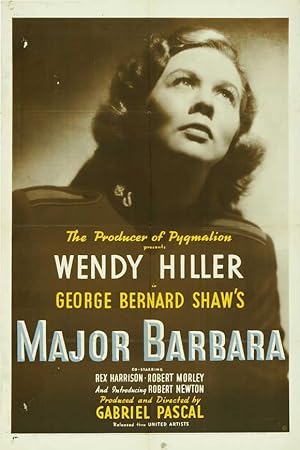
Major Barbara Page #2
- APPROVED
- Year:
- 1941
- 121 min
- 333 Views
I'm as poor as a church
mouse, like all scholars.
I'm no good for anything in
the way of worldly success.
But what does that matter?
We're all poor here.
We never think of money or success.
When all our money's
spent, we pray for more.
And it comes. It always comes.
Take your mind off such things.
And now...
shall we pray together?
I never pray. At least, not in your way.
The new thing that's come
to me is not that I'm saved.
I was saved when I was five years old,
when I first swallowed your religion.
Since then I've swallowed 20
religions. It's my life's work.
I'm interested in the
essence of all religions...
not in their catchwords or in yours.
Let us find it for you here. We can.
Nonsense. I have more to teach you
about religion than you can yet imagine.
You think so?
Then why have you come here with me?
Why did you hold up your hand?
Because I have impulses
that I cannot explain.
They come very seldom, but when
they come, nothing can stop me.
There's an end of my conscience,
of my prudence, of my reason.
Such an impulse seized
me the moment I saw you.
You may be poor. Our table
manners may be different.
Our relatives may not mix.
Probably everything is against our
associating with each other. No matter.
I'm going to join the Army. I will
put on a uniform and beat the drum.
In short, I am hopelessly and
forever in love with you...
and will follow you to the end
of the world until you marry me.
Is that plain?
Perfectly.
And now will you begin
by seeing me home?
I should like to put you through your
first trial by showing you where I live...
and introducing you to my family.
God has some little
surprises for you, my friend.
Have we far to go? What about a taxi?
We don't run to taxis in
this part of the world.
Most of us have never been in
one. We'll have to take a bus.
Oh, there's a 73. Jump in.
Don't ring. I have a latchkey.
By the way, I'd better know
your name before I go in.
Well, you haven't mentioned yours,
and it's I that have to introduce you.
My name's Adolphus Cusins.
Adolphus? What a name.
I shall call you Dolly.
My relatives do. I wish they didn't.
Introduce me as Professor Cusins.
Allude to me as Miss Undershaft.
Undershaft. Not
Undershaft, the cannon king?
Skode? The multimillionaire?
Don't worry, Dolly. I haven't
seen him since I was that high.
You'll find my mother
much more terrifying.
[Children Shouting]
[Children Laughing]
Remember the first time we
caught a bus here, Major?
Yes. And you wanted to
take me home in a taxi.
I've cured you of those
extravagant ideas, haven't I?
Yes. Takes the daughter
Translation
Translate and read this script in other languages:
Select another language:
- - Select -
- 简体中文 (Chinese - Simplified)
- 繁體中文 (Chinese - Traditional)
- Español (Spanish)
- Esperanto (Esperanto)
- 日本語 (Japanese)
- Português (Portuguese)
- Deutsch (German)
- العربية (Arabic)
- Français (French)
- Русский (Russian)
- ಕನ್ನಡ (Kannada)
- 한국어 (Korean)
- עברית (Hebrew)
- Gaeilge (Irish)
- Українська (Ukrainian)
- اردو (Urdu)
- Magyar (Hungarian)
- मानक हिन्दी (Hindi)
- Indonesia (Indonesian)
- Italiano (Italian)
- தமிழ் (Tamil)
- Türkçe (Turkish)
- తెలుగు (Telugu)
- ภาษาไทย (Thai)
- Tiếng Việt (Vietnamese)
- Čeština (Czech)
- Polski (Polish)
- Bahasa Indonesia (Indonesian)
- Românește (Romanian)
- Nederlands (Dutch)
- Ελληνικά (Greek)
- Latinum (Latin)
- Svenska (Swedish)
- Dansk (Danish)
- Suomi (Finnish)
- فارسی (Persian)
- ייִדיש (Yiddish)
- հայերեն (Armenian)
- Norsk (Norwegian)
- English (English)
Citation
Use the citation below to add this screenplay to your bibliography:
Style:MLAChicagoAPA
"Major Barbara" Scripts.com. STANDS4 LLC, 2024. Web. 19 Apr. 2024. <https://www.scripts.com/script/major_barbara_13197>.


Discuss this script with the community:
Report Comment
We're doing our best to make sure our content is useful, accurate and safe.
If by any chance you spot an inappropriate comment while navigating through our website please use this form to let us know, and we'll take care of it shortly.
Attachment
You need to be logged in to favorite.
Log In